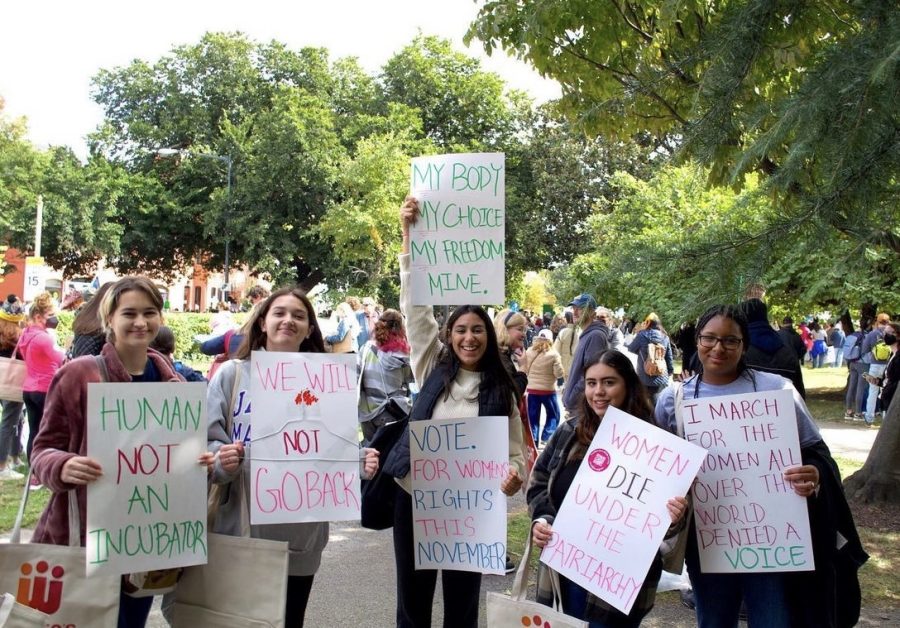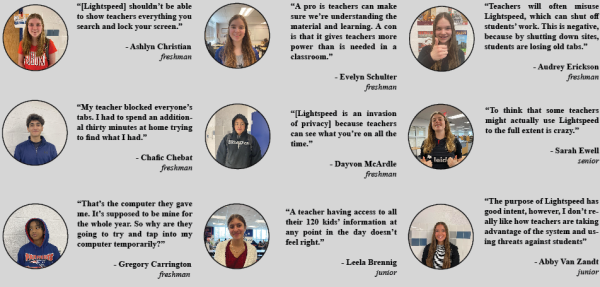To participate or to not participate
Photo courtesy of Paula De Megret-Murray
Members of the Young Democrats Club participated in the Women’s March in Washington D.C.. Attending protests for critical issues is an impactful way to spread awareness.
As teenagers become adults, a daunting political landscape awaits them. Though Generation Z is quite vocal online, alienation from political institutions and harsh partisan lines cause many to shy away from participating in politics.
“We no longer focus on our similarities; we are, in fact, defining ourselves by our differences. We have dehumanized one another. Politics has become saying no to whatever the other party wants,” said junior Paula De Megret-Murray, president of the Young Democrats Club.
According to estimates from the Center for Information & Research on Civic Learning and Engagement at Tufts University, 27% of 18-to-24-year-olds voted in the most recent midterm elections. Many factors contribute to this low amount of participation from young people. One of the most significant in recent years is the political apathy fueled by a highly polarized political climate.
“Even though I would consider myself pretty left of center, I have felt hesitant in expressing more conservative views I may have,” said senior Gage Hatalosky. “I think a good first step in allowing people to freely express their beliefs would be to try to counteract cancel culture and reject the fact that you can get kicked out of college or fired if you criticize things like affirmative action, BLM, etc..”
Despite the current political climate, there are still young people who are excited to begin participating in politics and view voting as the first step toward that.
“Before this year, I was not the one making the decisions for the country, but I became 18 this year and was told to go vote like it was a huge celebration of adulthood,” said senior Lydia Nelson. “My vote matters, and as an American, I have the right for it to be heard.”
Nelson even went as far as to line up at six a.m. on election day to cast her first ballot during the midterms. However, others do not often share her commitment to this civil duty. Not wanting to choose between “the lesser of two evils” is a sentiment that can become a deterrent from participating at all.
“I just turned 18, so I haven’t voted in anything yet. However, I do plan to vote in more local elections and possibly presidential elections [only] if I really like a candidate,” said Hatalosky.
Hatalosky expressed that he would abstain from casting a ballot if neither candidate personally aligned with his views. Voting is a choice, so some would rather only do it if they feel 100% confident in the decision.
Another reason behind political apathy is the idea that a single person’s choice means nothing amid a collection of others who may think otherwise. Getting swept up in the thought process of there being no point in participating is easy to do.
“It’s hard to get involved when you feel like you can’t make a difference. But remember this: one person can be enough to do the trick. In this election a few weeks ago, several seats in the House of Representatives were decided by the narrowest of margins,” said Congressman Gerry Connolly, the representative for Virginia’s 11th congressional district. “Don’t let anyone tell you your vote doesn’t matter—one voice can make all the difference.”
Besides voting, there are many ways to become involved in politics, especially on the local level. Volunteering in phone banking and text banking during election seasons can help contact potential voters to notify them of a specific candidate, as well as how to access voting centers. Canvassing, the more traditional version of this, is going door to door to increase mobilization.
Another accessible way to do so is to reach out to your local senators and representatives in Congress. Sending emails, calling offices, or even writing letters by hand are ways to ensure those directly making decisions on behalf of the community acknowledge different perspectives. Students can access many of these opportunities through the Young Democrats Club, which De Megret-Murray hopes anyone can be encouraged to participate in regardless of political affiliation.
“We are here to teach, learn, and give back to our community,” said De Megret-Murray. “I believe that in this club, I can bring individuals together from all sides of the political spectrum.”
Of course, progress can only be achieved with effort and dedication. Change is not impossible, so speak up for human and political issues regardless of how others perceive them.






